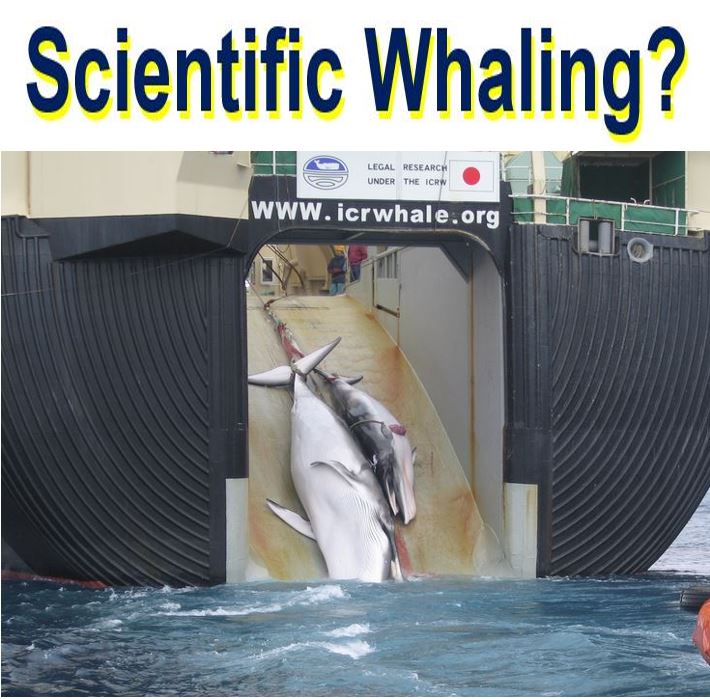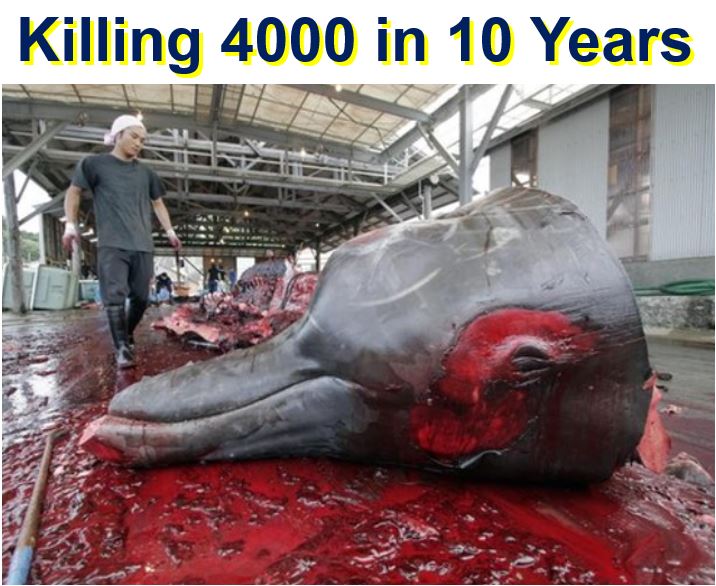Japanese whalers came back from their Antarctic hunt with 333 dead whales, following a one-year suspension. According to media reports, many of the minke whales caught were pregnant females.
In 2014, an International Court of Justice ruled that whaling in the Southern Ocean by Japanese whalers should stop, prompting the country to cancel its hunt that season. At the time, Japan’s whaling industry said it planned to resume at a later date.
Japanese authorities then amended their plan for the following season to reduce the number of minke whales it planned to catch by two-thirds compared to previous hunts.
 Japan says its whaling programme is part of a scientific project. What kind of scientific programme includes slaughtering a mother and her calf? (Image: Wikipedia)
Japan says its whaling programme is part of a scientific project. What kind of scientific programme includes slaughtering a mother and her calf? (Image: Wikipedia)
International condemnation
Despite international condemnation which included the United States, an important Japanese ally, the fleet set out in December 2015.
In December 2015, Julie Bishop, Australia’s Foreign Minister, and Greg Hunt, the country’s Environment Minister, said in a joint statement:
“There is no scientific basis to include lethal methods in Japan’s whaling program. We are working with other like-minded nations to build international consensus against Japanese whaling. We are also exploring options for further legal action.”
 What kind of scientific project requires the killing of 4000 whales in 10 years?
What kind of scientific project requires the killing of 4000 whales in 10 years?
Joji Morishita, Japan’s Commissioner to the International Whaling Commission, said in response to the international condemnation that his country had met the international court’s new requirements. He emphasized that Japan simply wants to make whaling sustainable and ‘promote healthy whale populations’.
When Japan announced in December it would send out a whaling fleet to catch 333 minke whales, New Zealand’s acting Foreign Minister Todd McClay, said:
“New Zealand’s deep disappointment at the Japanese Government’s decision. New Zealand is strongly opposed to whaling in the Southern Ocean. We call on Japan to take heed of the 2014 International Court of Justice decision and international scientific advice concerning their whaling activities.”
“In early 2015, the International Whaling Commission’s Expert Panel issued very clear and unambiguous recommendations that Japan postpone the lethal components of its research proposal.”
Fleet met goal of 333 whales
On Thursday, all four-vessels that make up the whaling fleet were back at Shimonoseki in southwestern Japan. According to the Fisheries Agency, it had reached its goal of catching 333 minke whales.
Ninety percent of the 230 females caught were pregnant – 103 males were also caught.
The Fisheries Agency said in a statement:
“The number of pregnant females is consistent with previous hunts, indicating that the breeding situation of minke whales in the Antarctic is healthy.”
Japan insists that the majority of whale species are not under threat of extinction or anywhere near that status. It adds that consuming whale meat forms part of its culture, even though the majority of its population no longer eats it.
In 1987, after an international whaling moratorium came into effect, it started the so-called ‘scientific whaling’ programme. It was found that despite this scientific term, most of the whale meat caught still ends up for sale in shops for human consumption.
Over the next twelve years, Japan says it plans to catch almost 4,000 whales ‘as part of a research programme’. The country insists that its ultimate aim is to resume full-scale commercial whaling.
Australian Greens criticize own government
Senator Peter Whish-Wilson, representing The Greens in Australia, accused his own federal government of turning its back on Japan’s illegal activity, which he described as ‘sickening’.
Mr. Whish-Wilson said:
“Not in 40 years has an Australian government done so little to prevent whaling on our watch and in our waters.”
Mr. Whish-Wilson is urging all Australians to call Prime Minister Malcom Turnbull or write a letter calling on the Federal Government to uphold its election commitment and send a customs patrol vessel to monitor Japanese whaling activity.
“The Australian government’s inaction has sent a signal to Japan that they can recommence whaling without recrimination,” Mr. Whish-Wilson said.
Video – Sea Shepherd collisions with Japanese whalers
